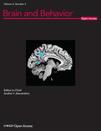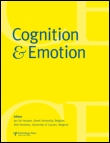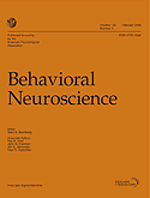
AGGRESSIVE BEHAVIOR
Scope & Guideline
Illuminating the Roots of Aggressive Behavior
Introduction
Aims and Scopes
- Psychological Mechanisms of Aggression:
Research examining cognitive and emotional processes that underlie aggressive behavior, including studies on impulsivity, rumination, and emotional regulation. - Social Influences on Aggression:
Exploration of how social dynamics, such as peer relationships, school environments, and cultural norms, influence aggressive behavior in various populations. - Biological and Physiological Factors:
Investigations into the biological underpinnings of aggression, including genetic influences, hormonal changes, and neurological correlates. - Intervention and Prevention Strategies:
Studies focused on effective interventions and prevention programs aimed at reducing aggression and violence in different settings, including schools and communities. - Cyberbullying and Online Aggression:
Research addressing the growing concern of aggression in digital contexts, examining the impact of online behavior and the psychological effects of cyberbullying. - Longitudinal and Developmental Studies:
Exploration of aggression across the lifespan, including how early experiences shape aggressive behaviors in adulthood.
Trending and Emerging
- Mental Health and Aggression:
An increasing number of studies are examining the links between mental health issues, such as PTSD and depression, and aggressive behavior, highlighting the importance of addressing psychological well-being in aggression research. - Impact of Digital Media on Aggression:
Research exploring the effects of video games, social media, and online interactions on aggressive thoughts and behaviors is on the rise, reflecting societal concerns about digital influences. - Victimization and Its Consequences:
There is a growing focus on understanding the reciprocal relationship between victimization and aggression, particularly in populations such as adolescents and marginalized groups. - Cultural and Contextual Factors:
Emerging studies are increasingly considering cultural influences and contextual factors in understanding aggression, moving beyond Western-centric perspectives. - Aggression in Diverse Populations:
Research examining aggression across diverse cultural and demographic groups is gaining importance, addressing the need for inclusivity in aggression studies. - Intervention Efficacy and Program Development:
There is a notable trend towards evaluating the effectiveness of intervention programs aimed at reducing aggression, emphasizing practical applications of research findings.
Declining or Waning
- Traditional Theoretical Models of Aggression:
Research grounded in earlier models of aggression, such as the frustration-aggression hypothesis, seems to be less frequently explored in favor of more nuanced and contemporary frameworks. - Gender-Specific Studies on Aggression:
While gender differences in aggression have been a significant area of study, recent publications suggest a shift towards a more intersectional approach that considers multiple factors beyond gender alone. - Aggression in Non-Human Subjects:
Research focusing on aggression in animal models, although still present, appears to be less emphasized compared to studies on human aggression and its social implications. - Aggression in Context of War and Conflict:
Research examining aggression in the context of war and political conflict has seen a decline, possibly due to a broader focus on interpersonal and community-based aggression.
Similar Journals

PSYCHOLOGICA BELGICA
Unveiling contemporary issues in psychology for all.PSYCHOLOGICA BELGICA is a distinguished open access journal published by UBIQUITY PRESS LTD, focusing on the broad and diverse field of psychology. Since its inception in 1975, this journal has been dedicated to the dissemination of high-quality research, making it a vital resource for researchers, practitioners, and students alike. With an impact factor that reflects its significant contribution to the field, PSYCHOLOGICA BELGICA stands out in the Q2 category of miscellaneous psychology and is ranked 75th out of 216 journals in General Psychology according to Scopus. The journal's open access model, adopted in 2004, ensures that the latest research findings are freely accessible, promoting a wider engagement with psychological science. With a commitment to fostering academic collaboration and innovation, PSYCHOLOGICA BELGICA continues to be an essential platform for advancing psychological knowledge and exploring contemporary issues within the discipline.

Journal of Aggression Maltreatment & Trauma
Championing Evidence-Based Approaches to MaltreatmentJournal of Aggression Maltreatment & Trauma is a premier scholarly publication dedicated to the exploration of the multifaceted nature of aggression, maltreatment, and trauma across diverse populations and settings. Published by Routledge Journals, a renowned division of Taylor & Francis Ltd, this journal serves as a vital resource for researchers, mental health professionals, and academicians committed to advancing evidence-based practices and knowledge in the fields of clinical psychology, psychiatry, and health professions. With an impressive impact factor that places it in the Q1 category for Health Professions (miscellaneous) and Q2 for Clinical Psychology and Psychiatry and Mental Health as of 2023, the journal fosters high-quality research and debate. The varied themes encompass empirical studies, theoretical discussions, and practical applications, making it a cornerstone for disseminating cutting-edge research from 1997 to the present. Although this journal is not open access, its extensive reach and reputation ensure that it continues to be a premier destination for impactful scholarship, facilitating dialogue among peers and promoting understanding in the critical areas of aggression and trauma.

Brain and Behavior
Advancing Knowledge in Behavioral Neuroscience.Brain and Behavior is a premier open-access journal published by WILEY, dedicated to advancing the field of Behavioral Neuroscience. With its ISSN 2162-3279, the journal has established itself as a vital resource for researchers, professionals, and students alike, fostering the dissemination of cutting-edge research since its inception in 2011. Renowned for its rigorous peer-review process, it enjoys a commendable Q2 ranking within the field, reflecting its impactful contributions and relevance in the scientific community. The journal not only emphasizes innovative studies that bridge behavioral science and neuroscience but also serves as a platform for diverse methodologies and interdisciplinary approaches. Accessible [open access](https://onlinelibrary.wiley.com/journal/21623279), Brain and Behavior invites submissions that explore the neural mechanisms underlying behavior, aiming to engage a global audience eager to expand the boundaries of knowledge in this dynamic field. Positioned in the heart of the United States, at 111 River St, Hoboken, NJ, it is strategically placed to collaborate with leading institutions and researchers worldwide.

CURRENT PSYCHOLOGY
Fostering Knowledge in the Evolving Field of PsychologyCURRENT PSYCHOLOGY is a renowned journal published by SPRINGER, focusing on a myriad of topics within the field of psychology. With its ISSN 1046-1310 and E-ISSN 1936-4733, this journal has established a significant footprint since its inception in 1981. Based in the United States, at One New York Plaza, Suite 4600, New York, NY 10004, CURRENT PSYCHOLOGY caters to an international audience of researchers, professionals, and students seeking to advance their understanding of both theoretical and applied psychology. Rated in the Q1 category for miscellaneous psychology in 2023 and holding a respectable rank of 58 out of 216 in the general psychology field according to Scopus, the journal emphasizes high-quality research and innovation. While it does not currently offer open access, it is committed to disseminating essential insights that address contemporary psychological issues, promoting a deeper engagement with the evolving landscape of psychology.

Behavioral Sciences
Connecting disciplines to illuminate behavioral phenomena.Behavioral Sciences is a prominent open-access journal published by MDPI, dedicated to advancing the interdisciplinary field of behavioral science. Established in 2011, the journal aims to disseminate high-quality research findings that explore the intricate connections between behavior, development, ecology, and neuroscience. With a commendable impact factor—ranking in the Q2 and Q3 categories across critical areas such as Development, Psychology, and Behavioral Neuroscience—the journal provides a platform for researchers and practitioners from diverse backgrounds to contribute groundbreaking studies. The accessible format ensures that valuable insights are available to a wide audience, promoting the application of behavioral science in various domains. Located in Basel, Switzerland, the journal is committed to fostering open dialogue and collaboration across disciplines, ultimately enhancing the understanding of complex behavioral phenomena.

Cyberpsychology-Journal of Psychosocial Research on Cyberspace
Navigating the Complexities of Online InteractionsCyberpsychology - Journal of Psychosocial Research on Cyberspace, published by Masaryk University, Faculty of Social Studies, is a pioneering open-access journal dedicated to the rapidly evolving field of cyberpsychology, exploring the intricate relationship between technology and human behavior. Since its inception in 2007, this journal has provided a vital platform for researchers and practitioners to disseminate findings on how cyberspace influences social interactions, mental health, and identity formation. With an impressive Q1 ranking in Communication and a strong presence in related fields, including Psychology and Social Sciences, the journal garners significant attention, reflected in its high rankings in Scopus. The open-access model ensures that groundbreaking research is freely accessible, promoting widespread engagement within the academic community. Located in the heart of the Czech Republic, it aims to foster interdisciplinary discussions and encourage critical research that addresses the psychosocial challenges in our increasingly digital world. Researchers, students, and professionals alike are invited to contribute to and benefit from the diverse and dynamic discourse facilitated by this esteemed journal.

COGNITION & EMOTION
Advancing Insights into the Mind-Emotion ConnectionCOGNITION & EMOTION is a leading academic journal published by Routledge Journals, Taylor & Francis Ltd, focusing on the dynamic interactions between cognitive processes and emotional responses. Established in 1987, this esteemed journal has made significant contributions to the fields of Arts and Humanities, Developmental and Educational Psychology, and Experimental and Cognitive Psychology, consistently ranking in the top quartile (Q1) across various categories. Housed in the United Kingdom, COGNITION & EMOTION boasts a remarkable impact factor, underscoring its influence and importance in advancing psychological research and theory. While this journal does not offer open access, it remains a vital resource for scholars, professionals, and students seeking to deepen their understanding of emotional and cognitive phenomena. With a commitment to rigorous peer-reviewed research and innovative insights, COGNITION & EMOTION is essential for anyone aiming to stay at the forefront of psychological studies.

Makara Hubs-Asia
Fostering Innovative Research Across Asia-PacificMakara Hubs-Asia is an esteemed open-access journal published by the University of Indonesia since 2002, dedicated to fostering innovative research across a diverse range of disciplines, particularly focusing on the socio-cultural dynamics in the Asia-Pacific region. With an ISSN of 2355-794X, this interdisciplinary journal promotes accessibility and engagement by allowing researchers, professionals, and students to share and disseminate their findings without the barriers of traditional publishing. While the journal is based in Indonesia, its reach and impact are global, representing a crucial platform for scholars aiming to contribute to the discourse within Asian studies and other relevant fields. Despite its H-index being currently unlisted, the commitment to high-quality, peer-reviewed content positions Makara Hubs-Asia as a significant resource for those seeking to deepen their understanding of Asia's complex societal correlations and contemporary issues.

BEHAVIORAL NEUROSCIENCE
Unraveling the Biology Behind ActionsBehavioral Neuroscience, published by the American Psychological Association, is a leading academic journal in the field of behavioral neuroscience, which focuses on the biological underpinnings of behavior across various contexts. Established in 1983, this journal has been a vital resource for researchers and professionals seeking to understand the intersection between neural processes and behavioral patterns. With an impressive impact factor that positions it in the Q2 category of Behavioral Neuroscience for 2023, it ranks 58th out of 88 journals in its field, showcasing its significance as a contributor to scientific literature. The journal fosters the dissemination of high-quality research and innovative theories that address critical questions in neuroscience, providing a platform for interdisciplinary collaboration. While it does not offer open access, the extensive distribution through academic libraries ensures wide availability for students, practitioners, and researchers alike. By continuing to publish cutting-edge articles through 2024 and beyond, Behavioral Neuroscience remains essential for those looking to stay at the forefront of advancements in understanding the biological mechanisms of behavior.

AGGRESSION AND VIOLENT BEHAVIOR
Fostering Understanding of Aggressive DynamicsAGGRESSION AND VIOLENT BEHAVIOR is a premier academic journal published by Pergamon-Elsevier Science Ltd, specializing in the intricate study of aggressive and violent behavior across various contexts. Since its inception in 1996, the journal has rapidly established itself within the field, currently ranked in the Q1 quartile in Clinical Psychology and Pathology and Forensic Medicine, and in Q2 in Psychiatry and Mental Health, in 2023. This distinction reflects its commitment to advancing research through high-quality, impactful scholarship, with Scopus rankings highlighting its significance—placing #36 out of 311 in Clinical Psychology and #28 out of 208 in Pathology and Forensic Medicine. With a vision to foster interdisciplinary discourse and research, AGGRESSION AND VIOLENT BEHAVIOR caters to a diverse academic community of researchers, professionals, and students interested in the psychological, sociological, and clinical dimensions of violence and aggression. While the journal is not open access, it remains a valuable resource for those dedicated to understanding and addressing the complexities of human behavior.